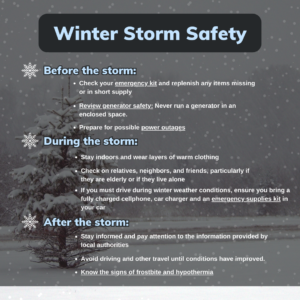The North Reading Fire Department would like to share the following safety tips ahead of tomorrow’s expected storm.
At this time, the National Weather Service (NWS) has issued a Winter Storm Warning across Massachusetts for Tuesday, Feb. 13. Snow accumulations of as many as 7-13 inches are possible, with wind gusts potentially approaching 40 miles per hour.
Travel could be very difficult to impossible with snowfall rates of 1 to 2 inches per hour at times. Areas of blowing snow could significantly reduce visibility.
The Department wishes to share the following winter weather safety tips and other important information:
Before a Winter Storm
-
Ensure you have a warm coat, gloves or mittens, hat, water-resistant boots, and extra blankets and warm clothing for each member of the household.
-
Check your emergency kit and replenish any items missing or in short supply, especially medications and medical supplies. Keep it nearby.
-
Prepare for possible power outages.
-
Be sure you have ample heating fuel. If you have alternative heating sources, such as fireplaces, wood- or coal-burning stoves, or space heaters, be sure they are clean and in working order.
-
Review generator safety: Never run a generator in an enclosed space.
-
Make sure your carbon monoxide detector is working correctly and that the outside vent is clear of leaves and debris. During or after the storm, make sure it is cleared of snow.
-
Home fires are common each winter when trying to stay warm. Review ways to keep your home and loved ones safe.
During a Winter Storm
-
Stay indoors and wear warm clothes. Layers of loose-fitting, lightweight, warm clothing will keep you warmer than a bulky sweater. If you feel too warm, remove layers to avoid sweating; if you feel chilled, add layers.
-
Check on relatives, neighbors, and friends, particularly if they are elderly or if they live alone.
-
Bring your pets inside before the storm begins. Move other animals to sheltered areas with a supply of non-frozen water. Most animal deaths in winter storms are caused by dehydration.
-
If you must drive during winter weather conditions, make sure all fluid levels are full and ensure that the lights, heater and windshield wipers are in proper working condition, and don’t leave the house without a fully charged cell phone, car charger and an emergency supplies kit in your car.
-
If your car gets stuck during a storm, stay in the vehicle. If you leave your vehicle, you will become disoriented quickly in wind-driven snow and cold.
After a Winter Storm
-
Stay informed and pay attention to the information provided by local authorities.
-
Avoid driving and other travel until conditions have improved. Even if roadways have been cleared of snow following a storm, any water left on the roadways may freeze, resulting in a clear sheet of ice, also known as black ice.
Residents are also asked to assist firefighters by clearing snow away from fire hydrants during and after the storm. Snow should be cleared 3-5 feet all around the hydrant so firefighters have enough room to connect a hose.
Due to the winter weather forecast, the Town of North Reading’s non-emergency services including Town Hall, Edith O’Leary Senior Center, and Flint Memorial Library will be closed tomorrow, Tuesday, Feb. 13.
Additionally, the Town’s contracted trash and recycling collection company, Republic Services, has informed the Department of Public Works that trash and recycling collection scheduled for Tuesday, Feb. 13, and the remainder of this week will be delayed one day. Residents along the Tuesday route are asked, to the extent possible, not to place their trash or recycling curbside until after snow plowing operations have ended on Tuesday but prior to 6:30 a.m. on Wednesday. The remaining days’ collections this week will also be delayed one day.
For additional winter storm safety information, visit NWS or the Red Cross. For any other questions on cold weather safety please visit weather.gov.

